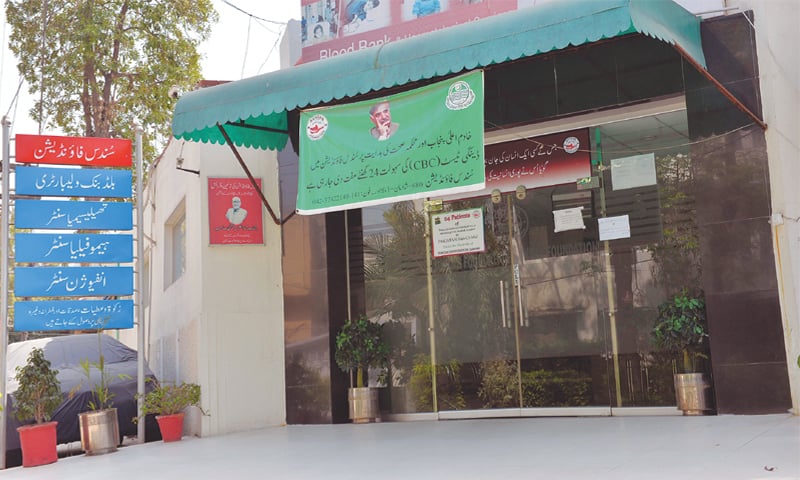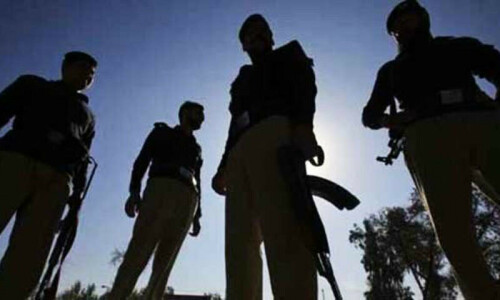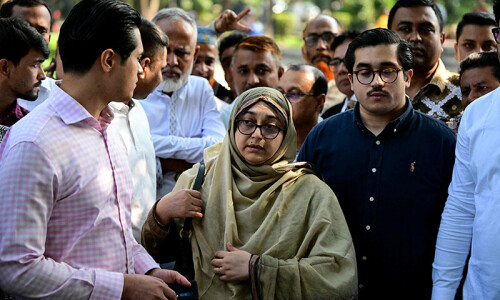THOSE who have ever required blood for either themselves or for someone close will know what a stressful, arduous task it is. From making frantic phone calls to sending text messages to friends to posting requests on social media, and asking for them to be shared further, one must leave no stone unturned to make sure a blood transfusion goes smoothly.
Blood banks, while established in many hospitals and even independently, may or may not be helpful, either due to inefficiency or the lack of the required blood group. Most of the time, one needs to run from one blood bank to the other to check if they’ve got what you require. These physically and mentally exhausting tasks are what brought three friends together with the “main objective is to solve the blood shortage problem”, according to their Facebook page.
RedDrop is a mobile phone application conceptualised and developed by Rawalpindi-based Atif Nauman, Imran and Asif after they had a hard time looking for blood, and realised the significance, power and outreach of the social media.
“It all started back in 2015 when the father of a friend, who was abroad, needed blood for a surgery. I ran around, asked people, but finally the response I received was through my posts on Facebook. That’s when I realised we could utilise social networks because a message spreads rapidly. I took the idea to two friends and that’s how we got to developing and designing the app,” says Nauman, a computer science graduate.
Launched in September 2016, the developers are struggling to get as many voluntary blood donors in the database as possible and simultaneously create awareness among people that such a platform exists.
Interested donors in any city across the country can get themselves registered with the app by filling in a short form, and after verification, they will be added to the database.
Requesting blood through this user-friendly app is very convenient: one just enters the blood group required, the number of bottles and when it is needed. A request is then sent through text message and app notification to the volunteers who match the criteria. Simultaneously, the requested information is uploaded in real time to the social networks connected with the app to amplify the message.
“We want to act as a channel connecting voluntary blood donors with those who need it. Currently, on an average we get 1.5 to 2 requests daily. The shortage of funds is hampering our growth and we are making efforts to reach our target of a million people in our database. Right now, we have around 2,000 potential donors. We also want to collaborate with medical stores, educational institutes, blood banks and even telecom companies to reach out to voluntary donors as well as the general public to make them aware of this facility. For all this, we need funds,” Nauman adds.
Most of the response they’ve so far got is through the word of mouth and posts on various Facebook pages. In their 2,000-strong database, the majority belong to Rawalpindi/Islamabad, Karachi and Lahore, with some from Hyderabad, Sialkot and Peshawar. This, in Nauman’s words, is not “extraordinary yet, and needs to reach all over the country.”
Hisham Shahbaz is one of the beneficiaries — he has both donated and sought blood through the app. He was referred to it by a colleague when his cousin needed blood back in November. “I was so happy that I got the required amount in the time specified without much hassle. It’s great that one can get blood through a single platform because those who need it know how it feels running around asking people,” he says.
Similarly, a couple of months ago, Junaid Ashraf, a student of the University of Central Punjab in Rawalpindi, found out about the app when a representative of the developers visited his university to brief students about it. The same month, when a friend’s father needed four bottles of O+ blood, Ashraf generated a request through the app and received half the amount within the time specified.
“I had a great experience as the app helped me solve my friend’s problem. I even recommended it to a few friends. I also keep an eye on their Facebook page for updates. It’s great that the app helps people because even a tiny gesture counts,” Ashraf adds.
Dr Zafar Iqbal, director of the Punjab government’s Institute of Blood Transfusions, is open to collaborating with the app, but insists that there is ample blood available free of cost for public-sector patients at blood banks of teaching hospitals across Punjab under his institute’s administrative control. He says there hasn’t been any complaint yet.
“We also have a replacement donation policy: keep blood donated by a relative or friend of a patient if the blood group is different from what is required and give them the desired blood group. We also organise blood camps to encourage voluntary donation to save lives. We keep visiting donation centres and ensure they are running smoothly. We can collaborate with the app if it is demonstrated to us because our aim is to save lives and ensure public-sector patients are not worried about blood shortage.”
Published in Dawn, April 2nd, 2017












































